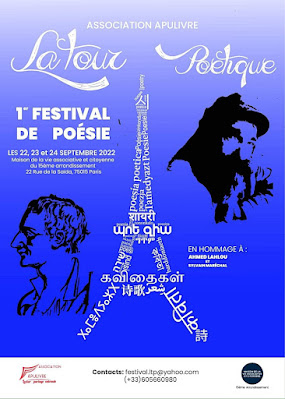Sometime during the past few days, as I write this, my words are being or have been read out at a poetry festival. This is not something that occurs for me often. In fact, virtually never.
But wait. Are they really my words being read out? That’s a fertile subject for discussion.
You see, I have this friend. I met him years ago when I was making my way home from a year’s study in Chile and found myself with several hours to kill during a layover in Lima. Through a series of events too complicated to go into right now, I wound up being invited to his family’s home for Sunday dinner and to pass the time until my evening flight to Los Angeles. Despite a significant gap in our ages, Mañuco (as he was called within the family) and I hit it off and formed a friendship that has endured through decades, marriages, parenthood and international relocations. He has lived many years in Paris, while I have dwelled these past score of years in rural Ireland. He is a poet, designer, dancer, all-around artist and general purveyor of Peruvian culture in the City of Lights.
If his name rings a bell with my readers, it is probably because he was one of the people to whom I dedicated my very first novel. And in case you are about to ask, no, he is not Antonio, the young traveling companion of Dallas and Lonnie in Maximilian and Carlotta Are Dead whose presence also weighs heavily in the two subsequent novels. Of course, any insights I gained from having a friend from a different (specifically, Latin American) culture informed the fictional character, but Antonio himself was more directly inspired by various Mexican and Mexican-American friends and acquaintances I had in my younger days. Still, the long-lasting bond between Dallas and Antonio does echo that of Mañuco and myself.
My Paris-based friend has always been a spinner of poems, and he has always written them in his native Peruvian Spanish. For years he has submitted them to various academic and literary journals. Many of these journals require works submitted in languages other than English to be accompanied by an English translation. At some point he asked me to translate one of his poems, and always up for a challenge, I gave it a go. He was delighted with the result and happily submitted it along with the original version. Since then, these requests have become a somewhat regular thing.
To be sure, I undertook this job with no small amount of trepidation. For one thing, I am not trained as a translator. My Spanish is pretty good (if I do say so myself), but translation is a whole different skill from simply understanding and communicating in a foreign language. Translation requires a specialized sort of training. Furthermore, I can in no way be considered a poet. I do read and appreciate poetry and have even churned out the odd bit of doggerel when the occasion required, but I am totally ill-equipped to write serious poetry of my own.
Despite this, I willingly produce translations of Mañuco’s poems because, for one thing, he is happy with and grateful for them. For another thing, it just seems to work because of the long and unusual mental bond between him and me. It’s a wondrous thing, as he and I are products of such different cultures, are native speakers of different languages, are different ages, and have actually spent precious little time in each other’s company. The vast majority of our communication has been through letters and, later, emails and internet audio conversations. Despite all this, when I read his poetry, I have some kind innate understanding of what he’s thinking, something he himself confirms. I do have to do a lot of research, sometimes painstakingly word by word, to find the right words or phrases, but only rarely do I have to consult Mañuco directly about his intentions or nuances. I doubt I could do the same for any other writer.
Part of the challenge of Mañuco’s poetry for a translator is that is tends toward themes of nature, earthiness and ribaldry along with a serious dose of surrealism. He tells me that my translations are invariably well received, although once he delighted in telling me a submission resulted in feedback that went roughly like this: your poem is pornography, and your translator is even more pornographic than you. It was never made clear to me whether this was contained in a letter of rejection or acceptance.
From Mañuco’s point of view at least, the old Italian aphorism traduttore, traditore (translator, betrayer) does not apply. He insists my translations make me a poet in my own right. Personally, I’m not so sure about that. Translation is definitely an art, but I’m not convinced that the translation of poetry is itself a form of poetry. I confess, though, I don’t mind the flattery.
Poetry or not, though, my English version of Mañuco’s words are being read aloud this weekend—along with the original Spanish words—at the inaugural edition of La Tour Poétique organized by the Association Apulivre in Paris. Hopefully, no fastidious listeners will be offended.
I’m definitely more comfortable with prose. And speaking of prose, allow me again to thank those of you who have purchased and read Last of the Tuath Dé. While the sales numbers certainly pose no competitive threat to the likes of James Patterson and J.K. Rowling, I’ve been gratified by the numbers of people who have sought out the book at the various online stores. I’ve been particularly impressed by the numbers of people who have gone to the expense of buying the paperback version.
Thank you all. (A translation of gracias a todos.)


No comments:
Post a Comment